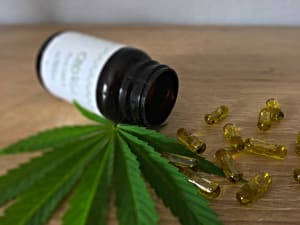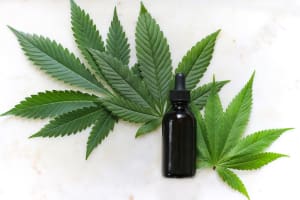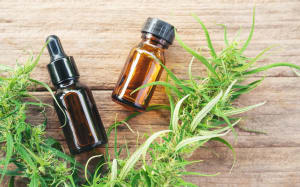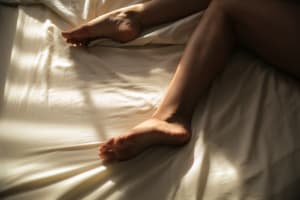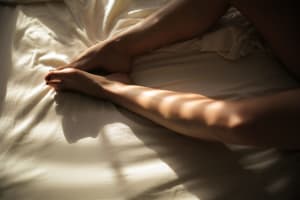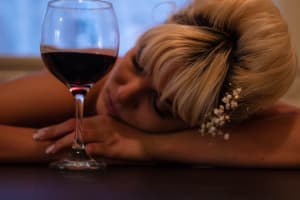What if you didn’t need an alarm clock? Imagine waking up naturally to pleasant daylight with plenty of time for a hot shower, a cup of coffee, and a croissant. Imagine arriving at work on time, feeling rested and ready to go.
Sound like a fairy tale? It’s not.
In fact, the more impossible ditching your alarm clock sounds to you, the more you should probably consider doing so.
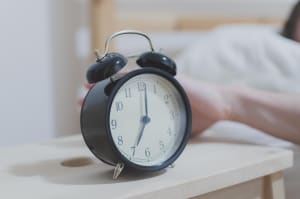
Why Alarm Clocks and Good Sleep Don’t Mix
Sleep occurs in stages that repeat throughout each night. This repetition is called the sleep cycle. Read our article on The Stages of Sleep and Sleep Cycles. Every cycle includes four stages:
- Stage One Stage One is the lightest stages. Your body relaxes, your mind drifts, and you may not even realize you are asleep. During this stage, you can wake easily.
- Stage Two Stage Two sleep is similar to Stage One but deeper. Your brain begins to actively block out external noises and disruptions and waking is more difficult.
- Stage Three During Stage Three you are in a deep and dreamless state. Waking is very difficult. Night terrors and sleepwalking can happen during Stage Three.
- REM Sleep REM is when dreams occur. Your mind reviews and interprets events of the day using the language of dreams. REM stands for Rapid Eye Movement. During REM your eyes move behind your closed eyelids as if you were awake and experiencing real events, but your body remains immobile so you don’t hurt yourself.
Throughout the night, your mind and body cycle between Stage Two, Stage Three, and REM Sleep. All stages of sleep are necessary for good health and adequate rest. When you use an alarm to wake up, the alarm can interrupt any of these stages, depriving your mind and body of the restoration a particular stage of sleep provides.
Some people wake up an hour or two before the alarm goes off and sleep lightly, checking the time every ten or fifteen minutes until it is time to rise. This habit is every bit as bad as being jolted out of a deep sleep by a blaring alarm. Instead of only one stage being interrupted, an hour or two of light sleep is substituted for the deep and dreaming stages you actually need.
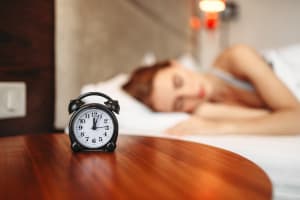
How to Live Without an Alarm
Living without an alarm is all about understanding your sleep habits and how much you actually need and then giving yourself the time and space to achieve that. Most adults need between 7 and 9 hours of sleep per night. A recent Gallup poll shows that an astonishing 40% of Americans get less than 6 hours, and 14% get less than 5 hours.
In fact, the average amount of sleep an adult American gets is 6.9 hours, less than the minimum amount recommended. Add to that the disrupting presence of LED alarms and multiple screened devices in the bedroom and you have a recipe for a chronically sleep-deprived nation.
Reversing this trend is fairly simple. First, make sure you are practicing good sleep hygiene. Make sure you have no TVs in the bedroom, no laptops, no work files, just a calm, cool place to get a good night’s rest.
Next, for two weeks simply record how long you sleep when you don’t have an alarm waking you up. Write the number down for each night. You may be surprised to discover that you wake up naturally without even completing the two-week sleep diary, but do it anyway. Once you have the average number, give yourself at least that much time per night.
For instance, if you find you need 8 hours of sleep per night and you need to get up at 6:00 am, that means you need to be in bed and ready for sleep by 10:00 pm. Try to keep a regular sleep schedule, even on weekends, and you’ll find waking up without an alarm is easy.
A Sunny Workaround
If waking up on your own means waking up in a dark room, you do have a natural and safe option to help you out. A sunrise alarm is an alarm that emits a small amount of light about a half-hour before your waking time and increases the amount of light until your room is as bright as day.
Sunrise alarms mimic the natural world and keep your natural rhythms and your sleep cycle intact, so long as you continue to give yourself enough hours in bed to sleep well.
No Time for Sleep?
Although recent polls make it clear that Americans are cutting corners by sleeping less, you may be surprised to learn that shaving even an hour off can impact your health in significantly negative ways.
Health problems associated with sleep deprivation include decreased performance and alertness, increased injury in the workplace and increased car accidents, anxiety and depression, heart problems, as well as memory and cognitive disorders.
You need good sleep the same way you need good food to eat and good air to breathe. If you don’t make it a priority, you could feel effects like increased illness, poor quality of life, reduced job performance, and stress at home.
The good news is that the same technology that seems to be robbing us of sleep can also help us get back to getting the sleep we need. High-tech foam, organic materials, and supportive construction are now used to create some of the most comfortable mattresses and bedding ever designed. Sunrise alarms mimic natural cycles effectively, and blackout curtains and shades keep bedrooms free from light pollution.
So make a commitment to ditch that alarm today. Your body, and your life, will thank you for it.
